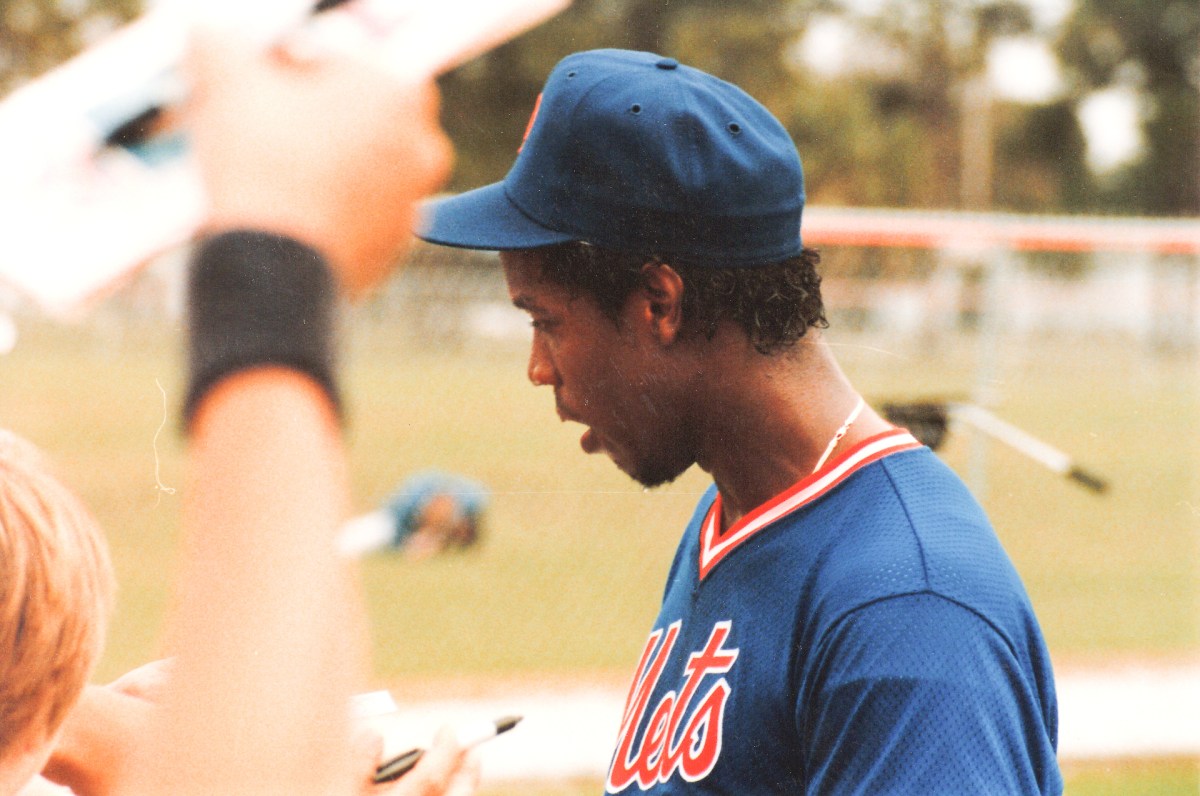“At Death’s Door Step,” screamed the cover of Tuesday’s New York Daily News.
“Doc, we love you, but you have to stop using coke,” blared a previous day’s cover of the tabloid.
Today’s front page…
AT DEATH’S DOOR STEP
Gaunt Gooden a ghost of himself https://t.co/DgserRCzGY pic.twitter.com/Fkqxyry8wt— New York Daily News (@NYDailyNews) August 23, 2016
Inside Tuesday’s paper, former Mets great Dwight “Doc” Gooden denied he was suffering from drug addiction and instead lashed out at ex-teammate Darryl Strawberry for instigating a very public intervention through the media.
“I have to try something before he’s dead,” Strawberry told the News‘ respected baseball columnist John Harper. “He’s a complete junkie-addict. I have been trying behind the scenes to talk to him and get him to go for help, but he won’t listen.”
Public intervention ‘not helpful’
Gooden’s apparent drug problem, if that’s what is indeed ailing him, is now playing out in full view, for the entire world to see. And Strawberry has not held back. Neither has Gooden’s friend, Janice Roots, who told the News that the dynamic ex-pitcher had “morphed into a cocaine monster.”
For the last few days, Gooden’s personal issues have been subject to daily scrutiny.
It all started when Gooden failed to appear at a WFAN radio station event with Strawberry last week. When pressed by a radio caller about Gooden’s absence, Strawberry said he feared the worst for Gooden.
But how effective are media-fueled interventions when someone is potentially deep in the throes of addiction?
Jeffrey Reynolds, who served five years as the executive director of Long Island Council on Alcoholism and Drug Dependence (LICADD) and is now the CEO and president of Family and Children’s Association, is not a believer in nudging addicts to intervention through shame and guilt.
“It’s not helpful,” Reynolds tells the Press. “I think generally it perpetuates the shame and stigma that goes along with addiction.
“It drives people underground. It makes it harder for them to get help rather than easier,” he continues. “If Darryl or anyone else really cared about Doc Gooden, they’d pick up the phone and have a private conversation rather than speculating and calling him out in public.”
In the interview with the Daily News that sparked this public feud between the two former teammates from the Mets’ hard-partying 1986 World Series championship team, Strawberry stressed that he reached out to Gooden prior to going public. Apparently that was ineffective.
Reynolds insists public shaming, even as a last ditch effort, is not the right move.
“I don’t think public pressure plays a role in someone’s willingness to get treatment,” he says. “I think it is quiet, kind, consistent—consistent being a key word—support.”
“This is happening between two former ballplayers, [but] these are conversations that are happening across Long Island every day in more homes than you can ever imagine,” Reynolds adds. “The reality is you can apply that gentle pressure, you can begin to institute consequences and those kinds of things, but we found consistent care and support over a period of time brings that person closer to treatment in a way that nothing else does.”
Still, Reynolds understands the motives.
“I think it’s well-intentioned,” Reynolds says of Strawberry’s attempt to help his friend through the media. “People understand that the consequences for untreated addiction include a whole number of things, not the least of which is death. And I think very often people will try one or two means to help that person get into treatment.
“If that fails, you begin pulling out all the stops, and my sense is that’s probably what’s happened here,” he continues. “But again nobody really knows if Doc Gooden is struggling with addiction or something else. It’s really hard to figure out what’s going on—and quite frankly, that’s why these should be private, not public conversations.”
Reynolds knows what addiction looks like. He’s seen it—in the eyes of struggling addicts and in doting family members working hard to get their loved ones the help they need. And it’s often shame, he says, that keeps people away from treatment centers.
“This is a disease that still carries an incredible amount of shame and stigma—and that shame and stigma is what frequently keeps people out of treatment,” Reynolds says. “Headlines like that perpetuate the shame and stigma. I don’t know if we do that for a lot of other diseases, but when it comes to diseases above the neck, everybody is more than happy to pile on.”
‘I don’t do cocaine’
Anthony Rizzuto, executive director of Families in Support of Treatment, an LI-based nonprofit that helps families of loved ones deal with addiction, echoes Reynolds’ sentiment—up to a point.
“Human beings are individuals and everybody reacts to things differently. When you deal with addiction, it is not an exact science,” Rizzuto tells the Press. “What might work for this patient completely has an adverse effect for the next patient.
“I think that guilt and shame is not a good way to go, but there are times when that’s been effective in helping people to be able to realize what dire straights they’re in, and, you know, suffer some of the consequences,” he adds.
Rizzuto says he’s trained in a model of intervention that’s opposed to utilizing blame and guilt to persuade an addict to accept help. Not until all methods are considered does Rizzuto believe this last ditch effort is warranted.
“This wouldn’t be the way I would lead,” he says. “This would be after failed attempts using different methods. And I have to believe that that’s happened already.”
Gooden, who demonstrated Hall of Fame potential upon making it to the Big Leagues with the Mets in ’84, first sought help for cocaine addiction in ’87—his fifth season in the majors. Gooden put together a remarkable run with the Mets during his first six years with the team, making four All-Star games and posting a sub-3.00 ERA four times. His best year came in 1985, when he won 24 games and struck out 268 batters and gave up an average of 1.53 runs per game.
That Hall of Fame-worthy stretch, however, also included run-ins with the law and a stint at a drug treatment center.
In a statement late Monday, Gooden said, “I don’t do cocaine and have not for years.” He went on to criticize Strawberry, another former Met who battled drug addiction, for going public.
“I had always been supportive of Darryl, during his best and worst days,” Gooden said. “I recall the time he was in prison, and I was there for him. I recall the times he struggled with his own addiction, and I was there for him then, too. I had never failed to be there for Darryl Strawberry.
“Last Thursday night, I was unable to attend an event at WFAN with Darryl,” he continued. “There were plenty of times when Darryl was unable to attend events as well. No one, most of all me, made any big deal out of [Strawberry’s] absence, nor should they have had.”
(Featured photo: Dwight Gooden during Mets spring training in 1986. Credit: Jeff Marquis)




































